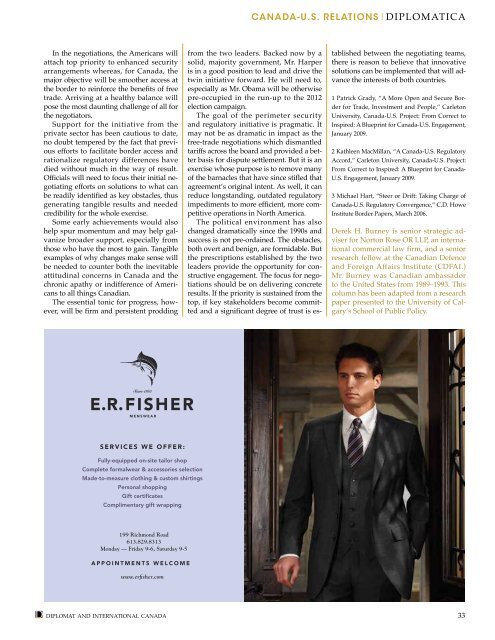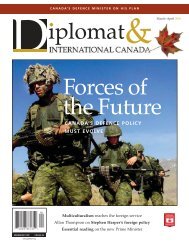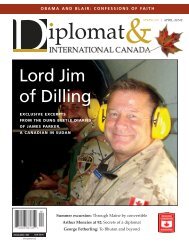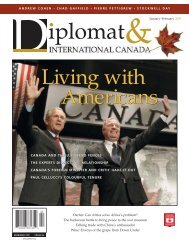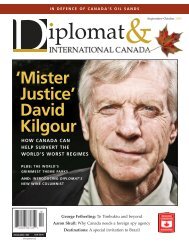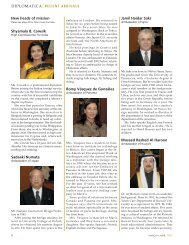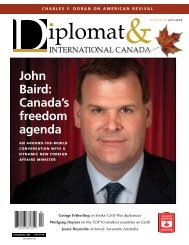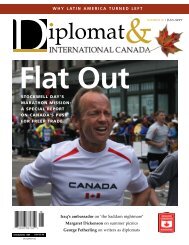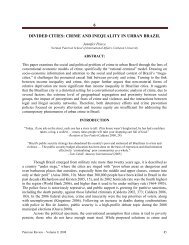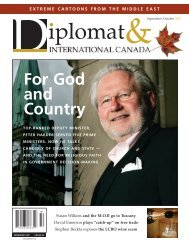the new petro power paradigm - Diplomat Magazine
the new petro power paradigm - Diplomat Magazine
the new petro power paradigm - Diplomat Magazine
You also want an ePaper? Increase the reach of your titles
YUMPU automatically turns print PDFs into web optimized ePapers that Google loves.
CanadA-U.S. Relations|DIPLOMATICA<br />
In <strong>the</strong> negotiations, <strong>the</strong> Americans will<br />
attach top priority to enhanced security<br />
arrangements whereas, for Canada, <strong>the</strong><br />
major objective will be smoo<strong>the</strong>r access at<br />
<strong>the</strong> border to reinforce <strong>the</strong> benefits of free<br />
trade. Arriving at a healthy balance will<br />
pose <strong>the</strong> most daunting challenge of all for<br />
<strong>the</strong> negotiators.<br />
Support for <strong>the</strong> initiative from <strong>the</strong><br />
private sector has been cautious to date,<br />
no doubt tempered by <strong>the</strong> fact that previous<br />
efforts to facilitate border access and<br />
rationalize regulatory differences have<br />
died without much in <strong>the</strong> way of result.<br />
Officials will need to focus <strong>the</strong>ir initial negotiating<br />
efforts on solutions to what can<br />
be readily identified as key obstacles, thus<br />
generating tangible results and needed<br />
credibility for <strong>the</strong> whole exercise.<br />
Some early achievements would also<br />
help spur momentum and may help galvanize<br />
broader support, especially from<br />
those who have <strong>the</strong> most to gain. Tangible<br />
examples of why changes make sense will<br />
be needed to counter both <strong>the</strong> inevitable<br />
attitudinal concerns in Canada and <strong>the</strong><br />
chronic apathy or indifference of Americans<br />
to all things Canadian.<br />
The essential tonic for progress, however,<br />
will be firm and persistent prodding<br />
from <strong>the</strong> two leaders. Backed now by a<br />
solid, majority government, Mr. Harper<br />
is in a good position to lead and drive <strong>the</strong><br />
twin initiative forward. He will need to,<br />
especially as Mr. Obama will be o<strong>the</strong>rwise<br />
pre-occupied in <strong>the</strong> run-up to <strong>the</strong> 2012<br />
election campaign.<br />
The goal of <strong>the</strong> perimeter security<br />
and regulatory initiative is pragmatic. It<br />
may not be as dramatic in impact as <strong>the</strong><br />
free-trade negotiations which dismantled<br />
tariffs across <strong>the</strong> board and provided a better<br />
basis for dispute settlement. But it is an<br />
exercise whose purpose is to remove many<br />
of <strong>the</strong> barnacles that have since stifled that<br />
agreement’s original intent. As well, it can<br />
reduce longstanding, outdated regulatory<br />
impediments to more efficient, more competitive<br />
operations in North America.<br />
The political environment has also<br />
changed dramatically since <strong>the</strong> 1990s and<br />
success is not pre-ordained. The obstacles,<br />
both overt and benign, are formidable. But<br />
<strong>the</strong> prescriptions established by <strong>the</strong> two<br />
leaders provide <strong>the</strong> opportunity for constructive<br />
engagement. The focus for negotiations<br />
should be on delivering concrete<br />
results. If <strong>the</strong> priority is sustained from <strong>the</strong><br />
top, if key stakeholders become committed<br />
and a significant degree of trust is established<br />
between <strong>the</strong> negotiating teams,<br />
<strong>the</strong>re is reason to believe that innovative<br />
solutions can be implemented that will advance<br />
<strong>the</strong> interests of both countries.<br />
1 Patrick Grady, “A More Open and Secure Border<br />
for Trade, Investment and People,” Carleton<br />
University, Canada-U.S. Project: From Correct to<br />
Inspired: A Blueprint for Canada-U.S. Engagement,<br />
January 2009.<br />
2 Kathleen MacMillan, “A Canada-U.S. Regulatory<br />
Accord,” Carleton University, Canada-U.S. Project:<br />
From Correct to Inspired: A Blueprint for Canada-<br />
U.S. Engagement, January 2009.<br />
3 Michael Hart, “Steer or Drift: Taking Charge of<br />
Canada-U.S. Regulatory Convergence,” C.D. Howe<br />
Institute Border Papers, March 2006.<br />
Derek H. Burney is senior strategic adviser<br />
for Norton Rose OR LLP, an international<br />
commercial law firm, and a senior<br />
research fellow at <strong>the</strong> Canadian Defence<br />
and Foreign Affairs Institute (CDFAI.)<br />
Mr. Burney was Canadian ambassador<br />
to <strong>the</strong> United States from 1989–1993. This<br />
column has been adapted from a research<br />
paper presented to <strong>the</strong> University of Calgary’s<br />
School of Public Policy.<br />
SERVICES WE OFFER:<br />
Fully-equipped on-site tailor shop<br />
Complete formalwear & accessories selection<br />
Made-to-measure clothing & custom shirtings<br />
Personal shopping<br />
Gift certificates<br />
Complimentary gift wrapping<br />
199 Richmond Road<br />
613.829.8313<br />
Monday — Friday 9-6, Saturday 9-5<br />
APPOINTMENTS WELCOME<br />
www.erfisher.com<br />
diplomat and international canada<br />
33


